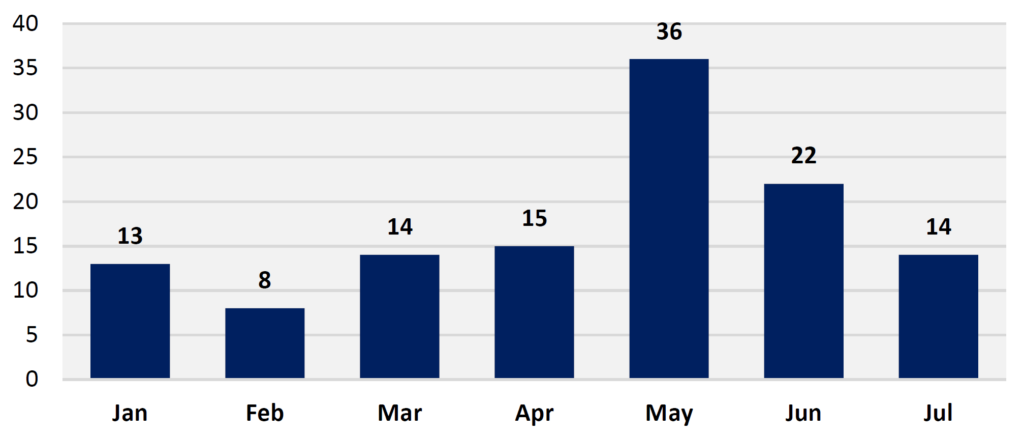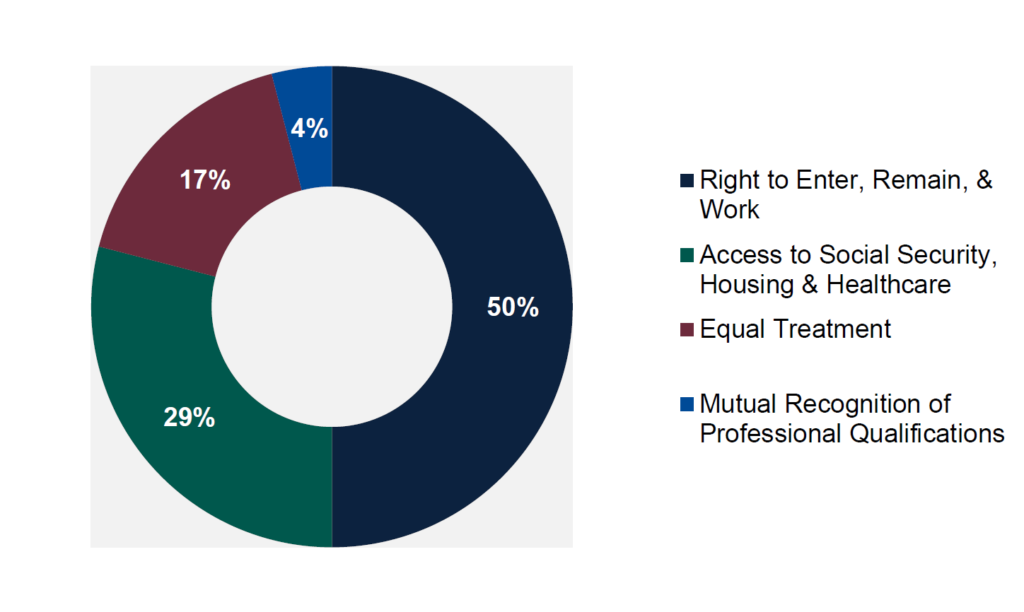Graph 1: Complaints up to 31 July 2021

The IMA received 122 complaints up to 31 July 2021.
Graph 1 (above) demonstrates that we received the most complaints in May and June, as the end of the so-called “Grace Period” for European citizens approached (the grace period was the first 6 months in 2021, during which EEA nationals could still apply for status under the EU Settlement Scheme without losing their rights). July marked the start of citizens needing to use and rely on their status (or application) under the EU Settlement Scheme to access and exercise their citizens’ rights.
Graph 2: Complaints received by affected right

Enter, Remain and Work in the UK & Gibraltar
Graph 2 (above) demonstrates that half of complaints reported to the IMA relate to the right to enter, remain and work in the UK. These complaints are, predominantly, connected in some way to the UK Government’s EU Settlement Scheme (EUSS), run by the Home Office. Complaints about the EUSS have ranged from difficulties with applications, to consequential delays in an application being processed in a timely manner.
Access to Social Security, Housing & Healthcare
The ability to access services provided by other public authorities (including local authorities) forms the second largest group of complaints to the IMA. This group of complaints is more diverse, ranging from difficulties applying for European Health Insurance Cards, to challenges related to applications to join housing lists or access universal credit.
Equal Treatment
The third largest complaints category relates to reports of discrimination in the context of the other rights above, where citizens believe they are not being treated equally. This is the most diverse complaints category, with themes including experiences entering the UK, the impact of the Covid-19 pandemic, and issues faced by family members of citizens.
Mutual Recognition of Professional Qualifications
The smallest group of complaints received to date relate to the ability to have qualifications previously obtained recognised in the UK. Themes in these complaints have related to healthcare qualifications.
Complaints in Scope
For a complaint to the IMA to be treated as in scope, part of our assessment involves identifying if a public authority is being complained about. For complaints that are in scope, the graph below (Graph 3) demonstrates that the majority of these complaints relate to the Home Office, followed by HMRC, DWP and DHSC.
Graph 3: Public authorities named in complaints to the IMA assessed as in scope

Finally, people that have complained to the IMA have been diverse. The IMA’s registered complainants represent 89% of EU member states (24/27). However, no citizens from EEA EFTA states (Norway, Iceland, Lichtenstein) have registered to date. Graph 4 (below) shows the relative proportions of registered citizens by EU country grouping.
Graph 4: Nationalities of citizens who have registered on the IMA’s complaints portal

Action we took on complaints
On a range of issues, the IMA is conducting desk research, has entered into early enquiries with a public authority, is in pre-inquiry investigations, or is monitoring the issue for further development.
Complaints and other intelligence received by the IMA are already contributing towards work to take action and resolve issues, including with EU citizens obtaining European Health Insurance Cards (EHIC), access to housing and an ongoing pre-inquiry investigation into the EU Settlement Scheme.
European Health Insurance Cards (EHICs)
The IMA received a number of complaints from people applying for the new UK EHICs who appeared to be encountering an overwhelmed system with significant backlogs potentially resulting in difficulties for these citizens in accessing healthcare.
Citizens also reported that communication about the delay was reactive and mostly via social media leaving many uncertain about what was happening with their application.
The IMA wrote to both the Department for Health and Social Care (DHSC) and the NHS Business Services Authority (NHSBSA) about our concerns that citizens were experiencing difficulty in being able to obtain a health insurance card which could lead to issues for them if they left the UK and then travelled to the EU and needed medical care.
As a result of our correspondence, DHSC and NHSBSA agreed to implement a number of changes. The IMA informed those who made a complaint of this early case resolution of the outcomes and is currently monitoring progress over a six-month period.
Access to Housing
The IMA received a complaint regarding Pembrokeshire County Council and how they were processing applications to join the housing waiting list.
The IMA was concerned that the council’s application process could pose widespread problems for EU and EEA EFTA citizens applying for social housing. Pembrokeshire County Council’s application of the regulations under the Withdrawal Agreement may have had the potential to adversely affect and discriminate against EU citizens within the UK who were applying to the council for access to housing.
As a result, pre-inquiry investigations were undertaken to seek clarity on these concerns. Pembrokeshire County Council was positive and approachable in its engagements with the IMA and agreed in principle to introduce several changes. The IMA will continue to monitor Pembrokeshire County Council’s compliance with these actions.
EU Settlement Scheme
The IMA has received complaints from citizens who have had issues when applying for settled status including difficulties with (for example):
- the application process;
- length of time taken to process applications;
- correcting details after making applications;
- contacting the relevant departments or complaining about the process; and
- access to using the digital route.
The IMA is in dialogue with the Home Office about these issues, in a pre-inquiry investigation. We concluded our first call for evidence in June, in order to gain a broader understanding of the EUSS through the ‘lived experiences’ of citizens who are familiar with the application process. We are currently reviewing what further action may be required.